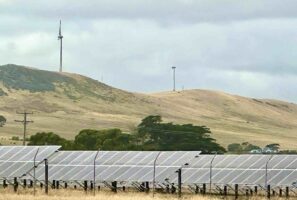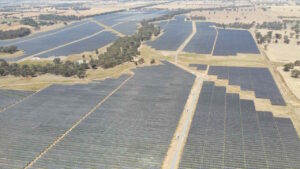Here’s a fun irony: when I posted my recent RenewEconomy article on Facebook, I had to use a sneaky trick to circumvent Facebook’s great big ban of Australian news. I shortened the link using a URL shortening service, and loaded the post with images to draw some engagement.
Unfortunately, Facebook noticed that one of the images was, in fact false information. That was because my post was debunking the fake meme, originating on Sky News Australia, and the image was automatically recognised by Facebook. But the ‘fact check’ posted by Facebook linked to an afp post that actually supported my article and effectively debunked the claim shared by Sky News, but it failed to mention the major media conglomerate from which it came. It’s done now: Facebook has reached a deal through which the government has essentially gutted its media bargaining code in exchange for Facebook returning news back to its platform.
This all ties in very neatly with the over-arching topic of the past few weeks: the role of big tech companies amongst Australia’s highly concentrated media environment. How concentrated? Right-wing News Corp commentator Andrew Bolt was recently bagging a documentary on his Sky News Australia show which he saw aired on the ABC – turns out that documentary was in fact produced by Foxtel, owned by News. Even Bolt can’t keep up.
The biggest players on this relatively small field have, as the result of months of sabre-rattling, ended up in a situation where they’re cutting deals with both Facebook and Google. Though it has always been clear that big tech companies get far less out of media sites than media sites get out of big tech, the government of Australia has stepped in to use its power to try and “level the playing field” and ensure that the deals struck between these various companies involve greater quantities of cash flowing into Australian media – particularly News Corp, which led the charge.
After all the posturing, all that’s happened is that Google, and probably Facebook very soon, will be paying cash to media companies in exchange for the right to hyperlink to their website on special, dedicated ‘news’ pages.
Nothing else changes – the problems of privacy, misinformation and hate will continue to exist within both social and traditional media. It may even worsen: now that Sky News Australia and various other News Corp sites will be boosted in Google’s “premium” news service, they’re likely to not only get even more traffic to their content on climate and energy, they’ll be paid for the privilege.
Google has not yet clarified how they’ll be treating misinformation created by large media outlets in Australia; Facebook hasn’t struck any deals with News Corp yet. What is clear is that fact check articles will be far from sufficient, and are extremely unlikely to interrogate their source back to media organisations. Like my own debunk of misinformation was slapped with a fact-check, there’s unlikely to be any real thought put into how they’re used – mostly, they’re just there instead of deleting, banning or blocking misinformation.
Neither industry wants to address this problem at the source, because the problem also brings in a pretty decent chunk of profits.
Of course, this has also come days after Facebook, Google, and various other tech sites have promised to adopt a misinformation code created by the Digital Industry Group. Perhaps this’ll force them into a corner and make them have to deal with their mainstream-media-misinformation dilemma? Not likely. Reset Australia’s executive director, Chris Cooper, told the Guardian:
“This limp, toothless, opt-in code of practice is both pointless and shameless. It does nothing but reinforce the arrogance of giants like Facebook. Any voluntary, opt-in code is inherently untrustworthy because we know it’s not in the business interests of these platforms to take real action on misinformation. The laughable thing about this code is that even if platforms choose to opt in, they can choose which provisions they have to follow. And then if it starts hurting their bottom line, all the have to do is pull out”
Of course, news content is excluded – sort of. The lengthy, unwieldy process for “complaining” about the daily tsunami of misinformation stemming from large media outlets is seen as sufficient. Recently, the Australian Press Council ruled, ridiculously, that the Australian’s campaign to downplay the role of climate in the Black Summer bushfires by blaming a gang of secret “arsonists” didn’t breach its code.
https://twitter.com/joshgnosis/status/1364318782924054528
Like the tech industry’s voluntary code, the APC is an industry self-regulation body that is opt-in – and the worst punishment is a sad little text notice buried on websites. Both industries will use this opt-in self regulation promise to stave off any real efforts to roll back the damage they can do to society.
For a very long time, there has been a general air of hesitancy to talk about misinformation within Australia’s dominant media outlets, particularly News Corp. Much of the conversation has flowed towards social media, while ignoring the provenance of claims within big media outlets. While this has worsened, big tech and big media have grown closer; forming deeper connections, a heavier symbiosis and sharing problems and societal harms between each other.
There’s an obvious escape that will be used: defining climate and energy misinformation as harmless, despite the fact that greenhouse gas emissions are definitely immediately harmful. The rise of COVID-19 misinformation has created an easy alternative that allows lies about climate to be treated as closer to opinion, with the ‘real’, more ‘immediate’ threat of harm from COVID-19 fake news.
When it comes to climate and energy, the consequences are hard to overstate. Denying climate science, attacking climate solutions are harmful or too expensive in some way, decrying climate activism and protest and generally attempting to downplay the urgency of action have been core mission goals for News Corp, and they have succeeded at many, over the past decade.
Now, they have the power of big tech to call upon, and it’s wildly improbable these companies will do what’s required to reduce the harm this misinformation causes.











